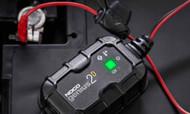Calculating How Long It Will Take to Charge a Lithium Battery
Posted by GMI Energy on Nov 26, 2025
Why Know a Lithium Battery's Charge Time?
Understanding how long it takes to charge a lithium battery isn’t just a curiosity—it’s a practical tool that directly affects performance, planning, and longevity. A properly matched charger ensures your batteries are ready when you need them and helps preserve their long-term health. Overcharging with brute-force amperage might seem efficient, but it can undermine lifespan and induce unnecessary thermal strain.
This matters whether you're refreshing a lithium deep-cycle before a long weekend on the water or keeping a row of golf carts ready for continuous service. Charge-time awareness allows you to synchronize equipment availability with actual demand. It eliminates guesswork and protects the investment you’ve made in high-quality batteries.
And why the focus on lithium? Lithium batteries—especially LiFePO4—charge with exceptional efficiency and have a minimal absorption phase compared to lead-acid batteries. Their linear charge behavior makes the math refreshingly straightforward. Lead-acid technologies like flooded, AGM, or gel require extended absorption at lower currents, adding variables that complicate manual calculations.
Those working with lead-acid should rely on an online Battery Charge Time Calculator, which automatically accounts for efficiency losses, absorption profiles, and voltage thresholds. It works for lithium too, but sometimes it’s satisfying to understand the underlying math without pulling out a slide rule.
Terminology
Before calculating anything, a few essential terms define the parameters of the charging process. These measurements govern how much energy a battery can store and how quickly it can safely receive that energy.
Battery Capacity (Ah) – The total amount of energy a battery can hold. Measured in amp-hours, it represents how many amps a battery can deliver over one hour. A higher Ah rating means greater storage capability.
Charging Current (A) – The rate at which electrical current flows into the battery. A higher charging current shortens charge time, but only to the extent that the battery’s chemistry and BMS allow.
Charging Efficiency (%) – The proportion of energy successfully stored in the battery compared to the energy the charger outputs. Nothing is perfectly efficient; some energy dissipates as heat. Efficiency is a critical factor that prevents overly optimistic time estimates.
These three variables form the backbone of any charge-time calculation.
The Variables
Once the terminology is clear, the process becomes surprisingly simple. You only need the battery’s capacity, the charger’s output, and an efficiency factor. Lithium iron phosphate (LiFePO4) chemistry is especially predictable, making the calculation nearly universal across brands.
LiFePO4 cells typically exhibit 98–99% internal charging efficiency, but real-world systems also include losses in wiring, heat generation, and charger electronics. Using 90–95% combined efficiency offers a practical, real-world estimate.
The Formula
(Battery Capacity in Ah ÷ Charger Amps) ÷ Efficiency = Charge Time (hours)
Example
Charging a 135Ah lithium battery with a 20A charger at 95% efficiency would look like this:
(135Ah ÷ 20A) ÷ 0.95 = 7.1 hours
A straightforward calculation—and one you can do mentally while browsing products.
Doing the Math = A More Efficient System
Knowing how to calculate charge time empowers you to design a charging system that works synergistically with your equipment. It helps avoid mismatched components, underperforming chargers, and wasted time. When you understand how long a battery needs to reach full capacity, you can schedule charging cycles with precision and ensure your gear is mission-ready whenever you are.
GMI Energy offers a broad collection of lithium batteries, AGM options, and chargers across 6V to 48V applications. Browse by Category or use our Battery Finder to locate products that fit your exact specifications without compromise.

